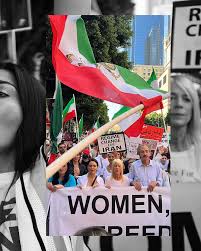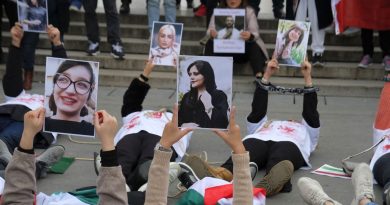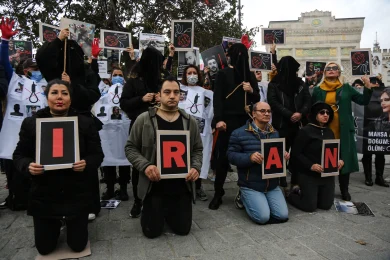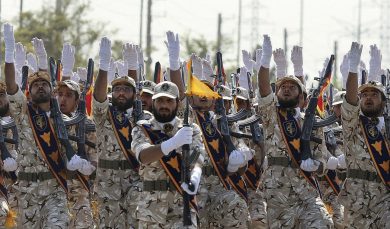Sanctions against Iran have long been a subject of global debate, seen by some as a necessary tool to pressure the Islamic Republic and by others as a blunt instrument that harms civilians more than it hinders the regime. But amid this geopolitical tug-of-war lies a critical question: how do sanctions impact Iranian women?
As the Islamic Revolutionary Guard Corps (IRGC) continues its role in repression, surveillance, and economic control, Iranian women remain among the most vulnerable—and the most defiant. Sanctions, often targeting sectors controlled by the IRGC, can either cripple a repressive system or exacerbate social and economic struggles, particularly for women.
This report explores both sides of the issue: are sanctions a weapon of oppression or a lifeline for freedom?
1. Sanctions and the Regime: What Are They Designed to Do?
The primary goal of international sanctions—especially those imposed by the United States, European Union, and UK—is to weaken the regime’s capabilities in areas such as:
• Nuclear development
• Terrorist funding (including proxy groups backed by the IRGC)
• Human rights violations
• Suppression of dissent
Sanctions typically target:
• Financial institutions
• Oil and gas sectors
• The IRGC and its affiliated companies
• Individuals involved in human rights abuses
But what does this mean for everyday Iranians—particularly women?
2. The Economic Impact on Iranian Women
A. Rising Poverty and Job Insecurity
Iranian women already face gender discrimination in employment and limited legal protections. Sanctions exacerbate this by:
• Triggering inflation, making basic goods unaffordable.
• Leading to job losses in sectors like education, healthcare, and retail—where many women are employed.
• Reducing opportunities for female entrepreneurship as banks and foreign partners withdraw.
B. Healthcare and Sanitary Product Shortages
Sanctions on banking and trade restrict Iran’s ability to import even humanitarian goods, including:
• Medicines for chronic illnesses
• Cancer treatments
• Sanitary and reproductive health products
These shortages disproportionately affect women and girls, limiting their access to essential care.
3. The Political and Social Consequences
A. Strengthening the IRGC’s Control
Paradoxically, while sanctions aim to weaken the regime, they can empower the IRGC in practice:
• The IRGC controls large parts of Iran’s economy, especially black market operations.
• As legitimate businesses collapse, IRGC-linked entities fill the void, profiting from shortages and price hikes.
• This deepens economic inequality and extends the IRGC’s influence, giving it more tools to suppress women’s rights movements.
B. Repression as a Distraction
With rising economic hardship, the regime often blames foreign interference and sanctions, justifying:
• Crackdowns on protests
• Media censorship
• Arrests of women activists
This narrative paints women’s rights campaigns as Western plots, making it harder for feminist voices to organize without retaliation.
4. Women as Victims—and Leaders—of Resistance
Despite the hardships, Iranian women continue to resist. The Women, Life, Freedom movement, ignited by the death of Mahsa Amini, showed the world that economic pressure alone will not silence calls for dignity.
Examples of Women Leading Despite Sanctions:
• Masih Alinejad, in exile, continues to lead digital activism.
• Narges Mohammadi, from behind bars, exposes prison abuses.
• Women-run NGOs find creative ways to support vulnerable families.
Sanctions have not broken Iranian women. In some cases, they have fueled their resolve, especially when global governments use sanctions strategically, tied to human rights accountability.
5. Smart Sanctions vs. Broad Sanctions
A. What Works
Targeted sanctions, like those imposed on:
• IRGC leaders
• Judges and prison officials
• Companies funding surveillance technology
are seen as more effective and less harmful to civilians.
They:
• Isolate abusers without punishing the public
• Signal international condemnation of gender apartheid
• Support civil society by naming and shaming perpetrators
B. What Backfires
Broad sanctions, especially on:
• Oil exports (cutting off national revenue)
• International banking (blocking food and medicine imports)
often hurt women and children most, without significantly reducing the regime’s repression.
6. Global Feminist Solidarity: The Role of the International Community
The global community plays a crucial role in ensuring that sanctions:
• Pressure the regime, not the people
• Are tied to clear human rights demands
• Include exceptions for humanitarian aid
• Support civil society groups, especially women-led initiatives
Recommendations for Action:
• Create sanction exemptions for women’s health and education.
• Fund secure digital tools for women activists.
• Recognize gender-specific consequences in every sanctions policy.
• Publicly support Iranian women-led resistance in international forums.
7. Voices from Iran: What Women Say About Sanctions
Interviews and reports from inside Iran paint a complex picture:
“We are suffering from both the regime and the sanctions. But without international pressure, they will never change.”
— A women’s rights activist, Tehran
“When the regime uses sanctions as an excuse, we lose support at home. We need the world to punish the guilty, not the sick and poor.”
— Female university student, Mashhad
“Target the IRGC. Help us, not hurt us. We are fighting a war with no weapons.”
— Labor rights organizer, Ahvaz
These voices highlight the urgent need for smarter, ethical sanction strategies that empower women instead of deepening their struggle.
Conclusion: Sanctions Must Empower, Not Erase
Sanctions are not inherently good or bad. Their impact depends on how they’re designed and implemented. When sanctions are targeted, transparent, and paired with support for civil society, they can be a lifeline for Iranian women. But when broad and indiscriminate, they become another weapon of oppression—hurting the very people they aim to help.
Join Our Newsletter!
Stay informed with the latest updates, news, and ways to take action in the fight for justice and global security. Sign up now to get updates delivered straight to your inbox!





